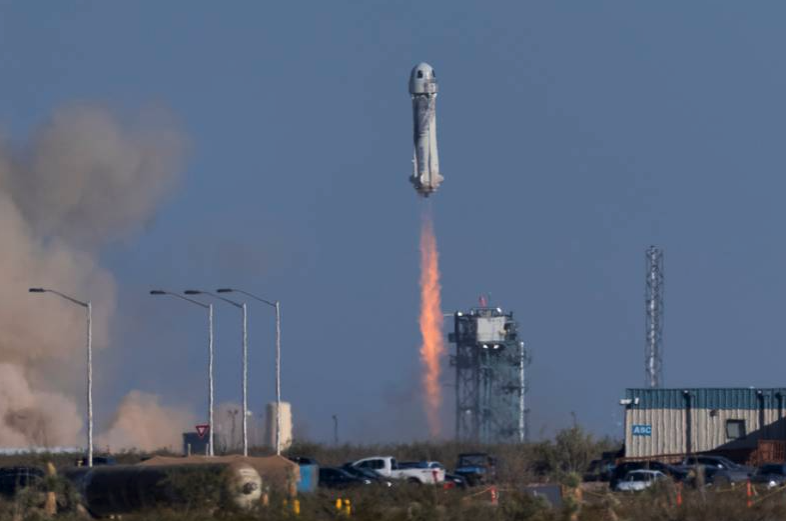Country’s space agency plans to excel further through public-private partnerships – similar to how Nasa evolved
The global rise of the private space sector has helped show how governments cannot go it all alone when reaching for the stars and it is no different for the UAE.
Over the next decade, the Emirates plans to invest more than Dh3 billion ($816 million) in the private space sector to grow the country’s capabilities in space.
Economic zones dedicated to space activities will be set up across Abu Dhabi, Dubai and Sharjah to allow start-ups and established businesses to set up operations.
Officials hope this would help the country become a major space power in the region, with a well-developed ecosystem consisting of public and privately led projects — similar to how Nasa has harnessed the power of the thriving privately owned space companies in the US.
In an exclusive interview with The National, Ibrahim Al Qasim, deputy director general of the UAE Space Agency, laid out plans for growing the private space sector.
“What this means is you will see more companies established and more of them plugging into these space economic zones, seeking to partake in missions and get more contracts than ever before,” he said.
“A few months ago, we announced a collaboration with Masdar City in Abu Dhabi to establish the first space economic zone. We’re hoping to establish a second in Dubai, which will be announced very soon.
“And the third one will be in Sharjah. The idea around this is to provide a soft-landing for companies that want to come from abroad.
“We’ve spent well over Dh1.5 billion ($408 million) on building capacity within the space industry over the last eight years and we’re more than doubling that over the next decade.”
Laws and regulations, including permits, which would allow interested companies to set up base in the UAE, are already available through a space law passed in 2019.
Companies would also have access to funding from a new initiative launched by the space agency, called Space Analytics and Solutions, which has a budget of Dh20 million.
The programme aims to help start-ups build space-based applications that focus on food security, climate change, infrastructure and the oil and gas industry.
The space agency hopes that as these companies progress, they would become less reliant on government funding.
“Space is expensive and it’s tough, and it’ll continue to be the role for governments to absorb the risk of starting these companies,” said Mr Al Qasim.
“Some of the greatest private companies in space today, for example, SpaceX, wouldn’t have achieved the amazing success that they have today and pushed the boundaries of innovation if it wasn’t for the support of Nasa and government contracts.
“However, it’s because of the way they were positioned to spearhead innovation and not depend on a comfortable government budget, that they were forced to really innovate and change what we think was possible in space. I think we will continue to do that.”
Emirates Mars Mission laid the path for the private space sector
The UAE’s journey towards growing a private space sector started with the Emirates Mars Mission, when a local company that did not even specialise in space started manufacturing parts for the Hope spacecraft.
Mr Al Qasim said the government contract helped the company “push the cusp of their industrial output and diversify their portfolio”.
“The ripple effect of the Emirates Mars Mission is quite enormous, including driving the public awareness and interest in space, science and technology. We saw a lot more interest in creating start-ups,” he said.
The UAE’s next big space mission, a spacecraft that would explore seven asteroids and perform a Venus fly-by, will be built mostly by the private sector.
It will be a defining moment for the country’s ambitions of a well-established private sector, as well as pave the way for future and more complex missions.
It is also hoped that more local companies that do not cater to the space sector would start getting involved as they did with the Mars mission.
The Mohammed bin Rashid Space Centre, an organisation in Dubai that has executed the UAE’s leading space missions, is working with companies on its upcoming Earth-imaging satellite MBZ-Sat.
Amer Al Sayegh, project manager of the satellite, said 90 per cent of the satellite’s part would be built locally.
“The main challenge we face when we work with the private sector is that they are used to existing industries like oil and gas, automobiles or infrastructure,” he said.
“When it comes to satellites systems, it was difficult to convince them that this would also have a big volume.”
The space centre has been working closely with companies to guide them on how to build satellite parts.
Falcon Group, for example, is a UAE-based organisation that is now manufacturing parts for the MBZ-Sat.
It has specialised in automation, hydrodynamic bearing and refurbishment since 1989, but had no experience in the space sector.
Rejin Jose Kurian, managing director of Falcon Group, said they have been learning about the industry from the space centre for more than a decade now.
“We’re more than happy to cater to this industry. It gives us an opportunity to learn more because we’ve been dealing with the construction, oilfield, marine and aerospace industries, which all have different sets of standards that you need to cater to,” he said.
“Astronautical is the top of the ladder, so if you have to partner with them and provide resources they need from us, we have to be at the best of our capabilities.”
The space centre has also launched the Space Ventures programme that gives office space and guidance to start-ups.
To grow the private sector even further, the space agency is also working on bringing space tourism to the UAE.
Mr Al Qasim revealed to The National that the agreement that was signed in 2019 with Richard Branson’s Virgin Galactic to bring space tourism flights to Al Ain Airport is no longer in effect, without explaining further.
Instead, the country is now working with Jeff Bezos’s Blue Origin to set up spaceports.
He said discussions with the company, which has already flown 20 people on its suborbital flights, are under way.
SOURCE: thenationalnews.com

